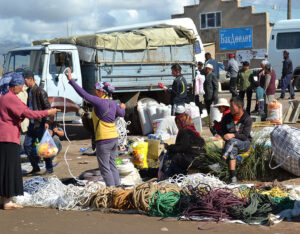The EU’s Rule of Law Initiative in Central Asia

Download “The EU's Rule of Law Initiative in Central Asia”
EUCAM-Policy-Brief-9.pdf – Downloaded 603 times – 514.00 KBIntroduction
The EU’s Rule of Law Initiative is one of three EU regional projects in Central Asia,1 first set out in the EU’s Central Asia Strategy in 2007, as a flagship engagement aimed at linking political priorities to practical assistance in the region. (2) The Initiative is intended, on the part of the EU and member states, “to support on-going modernisation of the legal sector, as part of a more comprehensive strategy to foster and consolidate stability, prosperity and respect for human rights in Central Asian countries”.(3) Rule of Law is now being viewed as a key policy goal amongst international development actors. Economic growth, political modernisation and the ability to attract foreign investment hinges, in part, on strengthening rule of law in transitional states.(4) Since the collapse of the Soviet Union, the Central Asian countries of Kazakhstan, Kyrgyzstan, Tajikistan, Turkmenistan and Uzbekistan have developed legal systems that contain some newly introduced elements of Western law, residual vestiges of the Soviet legal system and elements of traditional practices and customs.(5) These legal systems are heavily personalised and prone to patronage. The presidents of each state hold sway and the judiciary lacks independence with power residing in the office of the general prosecutor who is appointed by the president. Impartiality, transparency, trial by jury (with the recent exception of Kazakhstan) and the guaranteed protection of citizens from arbitrary action by the state are all features absent in the legal system, along with public confidence.(6)
The EU Rule of Law Initiative intends to engage with Central Asian states on the issue of rule of law using a two-pronged approach, applying high-level political dialogue and specific technical programmes. Although the initiative is still in its early stages, there are issues and problems concerning the process of its implementation and some normative limitations inherent in its approach. Currently, the focus is on the commercial and trade rewards (for both the EU and Central Asian states) that transforming the legal and judicial systems can bring rather than the good governance and human rights benefits. It leaves the EU open to criticism that its role as a fully realised normative power is weakened in this instance. This Policy Brief analyses the development and implementation of the EU’s Rule of Law Initiative in Central Asia, paying attention to the process and problems of political dialogue, the coordination of specific long-term projects through various agencies and the normative limitations of the approach. It recommends that the Initiative would benefit from a long-term commitment by EU member states to this issue in the region, which would be set out in a substantive, publicly agreed document punctuated with clearly stated benchmarks for development. The technical projects on the ground would also profit from greater transparency and coordination.
Development of the Initiative
A commitment to developing a Rule of Law Initiative appeared in the EU’s Central Asia Strategy as a concrete policy goal to address specific priorities supporting Central Asian states’ efforts of legal and judicial reform. The Strategy stated that EU member states would allocate funds towards the Initiative, second judicial and administrative experts to Central Asian states, provide training opportunities, support the transparent implementation of legal reform, facilitate international exchange through the organisation and sponsoring of conferences and foster cooperation between the Central Asian states and the Council of Europe’s advisory body on constitutional and legal matters, the Venice Commission. In the Strategy’s joint progress report, published in June 2008, the Initiative remained in its developmental stages.(7) The report indicated an initial concept paper had been agreed and shared with the Central Asian states at the EU-Central Asian troika meeting in Ashgabat in Turkmenistan in April 2008.(8)
The concept paper envisaged two kinds of action: an EU-Central Asia Rule of Law Platform and specific long-term projects. The key objective of the platform is to step up policy dialogue between the EU and Central Asian states on priority themes. Dialogue is foreseen to occur at three levels: the ministerial level, which is intended to discuss and review policy development of legal reforms and required training for each state’s legal professions; and technical meetings at regional and national levels on legal reform. The second action, specific long-term activities, is intended to provide Central Asian countries with guidance for their legal reform efforts. This will involve programmes provided by EU member states aimed at offering assistance and advisory services with regards to the development of the Central Asian states’ judicial systems and legal professions, the support of professional legal reform and regional exchange programmes.(9) In particular, projects will be implemented with regard to reinforcing the cooperation between constitutional courts, modernising the training of young lawyers and implementing the legal guarantees for the accused in court.(10)
Progress only began with the official launch of the Initiative at a Ministerial Conference in Brussels on the 27-28 November 2008. The Ministers of Justice of the EU and the Central Asian states released a joint communiqué welcoming the development of the initiative, emphasising the importance of exchange and expertise, expressing the will to strengthen cooperation on the basis of joint projects connected to legal and judicial reform and emphasising the necessity of basic and further training for all legal and judicial professions as vital for strengthening rule of law in the region.(11) One of the key outcomes of the conference was a commitment from the Central Asian states to permit discussions and assistance on the rule of law at a regional as well as bilateral level. Agreement was also reached to hold two conferences related to rule of law issues. The first, originally planned for June 2009 in Bishkek, Kyrgyzstan and organised by Germany, has now been postponed until September. The second conference, to be organised by France, is also planned for September 2009 in Tashkent, Uzbekistan. A further major conference on rule of law is planned to be held in 2010 in Central Asia too. The Ministerial Conference in Brussels indicated that Germany and France were leading co-sponsors of this initiative, driving it forward on behalf of member states and the European Commission, with Germany acting as the senior partner.
In what context?
Rule of law is the “rule of rights contrasted by the lack of checks and balances in the constitutional, legal and judicial framework”.(12) The Central Asian states are widely associated with authoritarian regimes with heavy personalisation of political office, weak judicial independence, a poor record of good governance and a low commitment to international standards of human rights. Freedom House, for example, in its 2009 report, highlighted the Central Asians states as “consolidated authoritarian regimes”.(13) Therefore, a commitment on behalf of the EU to support reform of legal systems governed by a series of inalienable rights feeds not only into improved circumstances within which to conduct business and trade but also addresses the need for the protection of citizens from the arbitrary actions of the state.
The Initiative is notable for not being entirely new. The EU member states and partner organisations (most markedly the OSCE) have been operating programmes in the region aimed at reforming judicial institutions and legal practices for some time. The premise of the new Initiative is to place these varying programmes under a single banner. From the EU’s perspective, the idea is to add value to and coordinate what already exists. While new financing for projects will emerge as part of the Initiative – mainly packaged within the work of the Venice Commission – the onus is just as much on coordinating existing programmes, namely those run by the German Technical Cooperation (GTZ), the Venice Commission and the European Commission. That these different programmes and activities are provided by various agencies has given the initiative a disjointed atmosphere.
Political dialogue
Above all, the initiative is aimed at establishing a dialogue on rule of law issues between Central Asian states, the European Commission, member states and other actors, e.g. NGOs. Political dialogue on issues such as reforming the legal systems of Central Asia, introducing greater transparency and combating corruption are understandably sensitive subjects. The previous tactic of sanctions, as in the case of Uzbekistan after the Andijan events of 2005, was perceived to have not been greatly successful. Instead the Initiative follows the German belief of undertaking unconditional dialogue with Central Asian states in an effort to foster reform in the region and ensure greater stability and security. Articulated as a new Ostpolitik, it represents a conciliatory and collaborative approach that entails a process of building trust and confidence between the EU and Central Asian governments to the extent that serious dialogue can take place on rule or law, good governance and human rights which under the policy of sanctions would be close to impossible.(14) Central Asian states are able to benefit from the EU’s experience of tackling rule of law issues in other regions such as parts of former communist Europe and more recently Kosovo. That Turkmenistan is now willing to adjust its national laws to international standards, to draft a report on torture in the country and to sit down and discuss human rights with EU officials in Brussels suggests that a degree of qualitative progress is being made.(15) However, through its unconditional engagement in the region, the EU is left open to criticism that it is legitimising regimes that often fail to meet international standards of human rights and democracy.
While the Initiative is aimed at offering a unified regional approach due to the five countries sharing similar problems with regards to rule of law, it also seeks to offer assistance in priority areas highlighted by the countries themselves. The idea is to make the initiative responsive to the particular needs of individual Central Asian states by handing them ownership of the Initiative. Different countries are progressing at different speeds on legal and judicial reform. Kyrgyzstan and Kazakhstan are further advanced in updating their legal systems than some of the other Central Asian countries. In Turkmenistan the priority is human capital reform – this includes legal training and the training of civil servants and elites. In Uzbekistan, Kazakhstan and Kyrgyzstan the focus is on reform within the judicial courts. In Tajikistan the priority is on penal reform.
Technical projects
Since the collapse of the Soviet Union, a number of external actors have been active in providing technical programmes related to the rule of law, legal reform and human rights issues in Central Asia. Prominent among them has been the OSCE, which has implemented a considerable policing reform programme in Kyrgyzstan among other human dimension activities, such as human rights, rule of law, good governance , penitentiary reform and the promotion of free and fair elections.(16) The UK and the Netherlands have been active too with the British running projects through the Office of International Development primarily aimed at good governance issues in support of its poverty reduction policy and the Dutch undertaking projects related to good governance, rule of law and democratisation through its Matra Programme. Civil society groups such as the Open Society Institute (OSI) currently have foundations in Kazakhstan, Kyrgyzstan and Tajikistan which all run law programmes. In Tajikistan for example the programme has been successful among other things in implementing general training projects for judges and facilitating the development of the local bar association.
Two of the most prominent actors in the region have been the German Technical Cooperation (GTZ) and the Venice Commission. The programmes of the GTZ have been central to promoting and supporting rule of law issues prior to, and since, the development of the Initiative. GTZ is active in all five Central Asian countries. Funded by the German Ministry of Economic Cooperation and Development, the GTZ has implemented programmes providing consultation on legislative reform with a focus on trade and commercial law and the training of judges and judicial staff. In total GTZ has spent €9.2 million on rule of law activities in Central Asia over the last ten years.(17) One of the most recent events sponsored by GTZ was a legal seminar held in Ashgabat to promote international legal standards among Turkmen lawyers.(18) Projects have included creating a two-year curriculum for young judges in Kazakhstan to apply the law in the civil procedure court and a project to ensure the Supreme Court in Kazakhstan publishes all its decisions and legislation transparently. Kazakhstan represents a focal point of much activity. The projects of GTZ have supported the development of legislation especially in the fields of company law, the limited liability code and the civil code.
New projects being developed within the initiative are to be packaged and implemented through the existing work of the Venice Commission. The German government has already made a voluntary contribution of €90,000 to the Venice Commission prior to the official release of €600,000 from the European Commission (expected later this year) towards the development of new rule of law projects in Central Asia. The Venice Commission, similar to the GTZ, has been operating in Central Asia for a number of years. By the end of the 1990s, Kazakhstan and Kyrgyzstan were awarded observer status with the Commission with Kyrgyzstan joining as a full member in 2002. Much of the Commission’s work, therefore, has been in these two states and focused on cooperating with the main constitutional bodies in both states. This has involved offering legal opinions on constitutional reform and draft laws to the election code, law on ombudsman and judicial reform. However, their work in Kyrgyzstan was affected by the chaotic constitutional aftermath of the ‘tulip revolution’, while in Kazakhstan cooperation was limited to seminars and conferences on these issues.
Since being invited by the European Commission to establish projects and work with the other three Central Asian states as part of the Rule of Law Initiative, the Venice Commission has been very active in the region. The frequency and depth of the Venice Commission’s activities vary from country to country and reflect the political realities of dealing with issues related to rule of law in some Central Asian states. These have included fact-finding missions to Tajikistan and Uzbekistan, on-going discussions with the Turkmen embassy in Brussels, a Venice Commission delegation attending a conference on judicial reform in Kazakhstan and a range of activities in Kyrgyzstan including legal opinions and the organisation of a number of conferences on the principles of the rule of law and the separation of powers.
Problems of process and normative limitations
The combined programmes of the GTZ, the Venice Commission, the European Commission, various EU member states and other agencies denote a wide sense of activity on rule of law issues. However, significant questions remain regarding the impact, purpose and long-term success of such programmes and the initiative overall. While the increased emphasis on rule of law through the development of the Initiative is welcome from a good governance perspective, there are problems and limitations to this approach, which fall broadly into two categories: problems of process and normative limitations.
The Initiative is organised by way of bringing together various pre-existing programmes and the formation of new programmes through selected agencies (the Venice Commission and GTZ). The problem arising from this construction is that the Initiative lacks overall clarity and feels disjointed. Rather than being a well thought-out and coordinated set of programmes linked to specific priorities (from both the EU and Central Asian governments’ perspective) aimed at reforming highly personalised and non-rationalised legal systems, it is a number of fragmented programmes with coordination and linkage between them distinctly lacking. The focus currently remains on the political dialogue platform, which resembles a political talking shop undermining the EU’s commitment to back up strategic priorities with practical action. While getting Central Asian leaders to engage on such issues is an important step forward, the initiative would benefit from a more joined-up, results-driven approach. The concept paper and the joint communiqué, while providing a basis for an initiative, are not adequate for a fully realised effort to reform the legal sphere in the region. Neither document provides a way to measure the progress of the Initiative against stated goals. The lack of a joined-up approach has resulted in a non-transparent process where the agencies involved in delivering programmes on the ground have found it difficult to know and understand what the other is doing.
The EU has prided itself on being a normative actor. Indeed the added value it offers Central Asia over other strategic actors (namely Russia and China) is a commitment to fostering, supporting and promoting rule of law, good governance and human rights. Yet, as has been suggested elsewhere, the EU’s actions as a normative power can be in contradiction to its economic, defence and security interests. (19) The Rule of Law Initiative adds to the sense of contradiction. At the political level the EU may highlight legal and judicial reform as the basis on which economic stability can be achieved for Central Asian states in order to build trust and avert suspicion. However, at the same time, the emphasis on commercial and trade law reform and building a transparent legal framework for the development of a market economy suggests there is more interest in trade benefits and energy security than in the human rights and good governance benefits of rule of law reform. Arguably these economic-legal norms form an important part of the EU’s normative function and make it easier for the EU to engage with Central Asia. Furthermore, developments in the Human Rights Dialogue (see below) do balance out the emphasis on economic-legal norms. Furthermore, the dialogue and practical programmes associated with the initiative are not entirely centred on the commercial side. A great deal of work has been done in recent years by the GTZ on the Civil Code in Kazakhstan, for instance. However, even in this sphere there are limitations. Under the Kazakh Civil Code, while there are guarantees of citizens’ rights and protection from the state, there is no guarantee of its practical effectiveness.
The limitations of the Initiative are also emphasised by the overall degree of ownership given to the Central Asian states themselves. Allowing the countries to recognise their own priorities within the dialogue and at the practical level, while sensible in encouraging their participation, ensures that they are able to set the rules of the game. It means programmes and discussions on serious issues of political transparency, corruption and the blatant abuse of international standards of human rights in the region will rarely be touched upon, if at all. Therefore, questions arise regarding the genuine impact of a Rule of Law Initiative in the region. Practitioners involved in programmes running on the ground in Central Asia have pointed to the success of the reform of the Civil Code and commercial and trade law in Kazakhstan and the influence of affiliated European agencies in helping shape constitutional reform in Kyrgyzstan. But what genuine impact can such programmes have on the highly personalised legal systems that revolve around the political will of the president (especially in the cases of Turkmenistan, Uzbekistan and Kazakhstan)? Running seminar programmes for lawyers on legal techniques is a serious effort at tackling a very sensitive issue at the ground level. However, will legal professionals be able to apply new techniques they have learnt within legal systems that do not support transparent, rational and independent action?
Gradual progress, however, is observable in particular with regards to rule of law issues in connection with the related (but officially separate) human rights dialogue on-going between the EU and Kazakhstan. The first annual seminar between Kazakh and EU academic and practitioning lawyers and NGO personalities took place in Almaty at the end of June 2009. The event brought together about 50 Kazakh and 20 mainly independent EU legal experts, who debated in detail aspects of judicial and penal reform. The seminar produced 13 pages of agreed recommendations addressed to the Kazakh authorities. The European Commission Head of Delegation concluded the seminar in pointing out that these recommendations would be taken as input into the official human rights dialogue, which includes annual sessions at senior official level. In one sense, the event in Almaty illustrates the positive results that can emerge on these issues in authoritarian states However, there is no guarantee that any of the recommendations will be taken up by the Kazakh government. The fact that no member of the government was present at the seminar and that the Kazakh authorities have a record of undertaking the least amount of reform that might be construed as acceptable by external actors does suggest progress will not be easy.
The impact of the Rule of Law Initiative is limited in its effectiveness, certainly in the short- to mid- term. This is evidenced by recent events in Uzbekistan which illustrate that the presidency of Islam Karimov aims at making certain that the judiciary and legal system is obedient to his political preferences. A new law passed in December 2008 amended the law on the bar and required all lawyers in Uzbekistan to re-qualify for their licence to practice. This suggests that the government is “trying to bring the bar to heel”.(20) Consequently, this provided the government with an opportunity to revoke the licenses of two prominent lawyers who had defended and protected the rights of journalists and human rights activists who were critical of the authorities.(21) Furthermore, the latest Freedom House report on Kyrgyzstan suggests that external actors’ reform efforts of the judicial system in the country have been unsuccessful partly due to a lack of will from judges and politicians. President Bakiyev remains able to appoint judges, with the judicial system often used to persecute the political opposition.(22) Such developments illustrate that despite engagement in the region judicial and legal reform is going to be very difficult to achieve.
Recommendations
- The EU should persist with the Rule of Law Initiative and embed it into external relations policy as a long-term policy objective. Reform of Central Asian legal systems is not going to happen in the medium term. While reform affecting trade and commercial opportunities might come in the short-term and reap economic benefits for the region and the EU, reform of civil law, tackling corruption and supporting the development of transparent, fair and rational judicial systems can only be achieved by making a long-term commitment.
- A long-term commitment should be marked by a clear, transparent and more elaborate public document setting out the EU’s priorities, strategies and goals regarding rule of law in Central Asia over the long-term (20-30 years). This should not focus so much on Central Asian states’ priorities but act as a commitment by the EU to its normative status regarding the development of good governance in the region. The current concept paper and joint communiqué provide a basis for a long-term initiative but are not substantive enough. A document publicly agreed by all member states regarding their commitment to supporting rule of law in the region is required for the long-term success of the Initiative.
- The document would benefit from a series of clear benchmarks and measures against which the Central Asian states’ progress on rule of law can be measured. Currently, there is no way of measuring the success of the Initiative. As Human Rights Watch (HRW) suggested in a 2008 report on the EU’s Central Asia strategy, “benchmarking, consultations, and transparency in implementation are of utmost importance in order for the strategy to realise its full potential impact on human rights”.(23) Similar to the HRW report, a series of benchmarks can be set for each Central Asian country related to reforming the courts, guaranteeing the independence of the judiciary and reforming the legal system to ensure that the law protects citizens from the state.
- While the political dialogue platform of the initiative has made significant inroads in engaging Central Asian leadership with these sensitive issues, a greater emphasis should be placed on the specific long-term technical projects at the ground level. Political dialogue only serves to legitimise the authoritarian leaderships and weakens the EU’s claim to be a fully realised normative power. While political dialogue is necessary for the success of technical projects – more financing and effort should go into developing projects through both the Venice Commission, the GTZ and other agencies. In this spirit greater effort should be made to bring other actors into the process. The Initiative would benefit from the experience and ideas of civil society groups (regional and international), parliaments and judicial actors as opposed to the current emphasis on high-level political elites.
- Consequently, the whole Initiative would benefit from a far more effective joined-up approach between the different agencies involved in delivering training programmes, seminars and technical exchange in the region. This could be led by the EU where each agency can share information and experience and work far more cohesively in making sure the Initiative achieves its full potential.
Conclusion
The EU’s Rule of Law Initiative remains at a nascent stage. Reforming the legal sphere in Central Asia is important from a commercial, good governance and regional and international stability perspective. Currently, the initiative at both the political and project level suggests a greater emphasis on the commercial benefits of legal reform. This emphasis leaves the EU open to criticism that it is prioritising economic-legal norms over other normative functions. The added value that the EU possesses over other involved actors in the region is its commitment to promoting democracy, rule of law, adherence to international standards of human rights and good governance. Greater focus in the Initiative should, therefore, be placed on the civic benefits of rule of law reform, penal reform, trial by jury and greater independence and transparency of courts (although progress is being made in these areas). For the Rule of Law Initiative to be effective, the EU and partner agencies need to make a serious long-term commitment to this issue. The Central Asian states possess both traditional and Soviet legacies within their legal systems, which make them susceptible to personalism, patronage and corruption. Such tendencies can be overturned, but it will take a generation and a serious, well-planned commitment from the EU marked by clearly stated benchmarks, a substantive publicly agreed document, and greater transparency and coordination among the technical programmes on the ground.
- The other two major initiatives are Water/Environment and Education.
- Council of the European Union, The EU and Central Asia: Strategy for a New Partnership, 20 July 2007 (http://www.auswaertiges-amt.de/diplo/en/Europa/Aussenpolitik/Regionalabkommen/EU-CentralAsia-Strategy.pdf).
- “EU Rule of Law Initiative in Central Asia”, concept paper presented at EU-Central Asia ministerial Troika in Ashgabat, Turkmenistan, 9-10 April 2008.
- Matthew Stephenson, “Rule of Law as a Goal of Development Policy”, World Bank, (http://go.worldbank.org/DZETJ85MD0).
- regimes in post-socialist Central Asia”, IIAS Newsletter, No. 34, July 2004 (http://www.iias.nl/iiasn/july04/ls.pdf).
- Kyrgyzstan is in the process of introducing trial by jury.
- European Commission External Relations: Joint Progress Report by the Council and the European Commission to the European Council on the implementation of the EU Central Asia Strategy, 24 June 2008 (http://ec.europa.eu/external_relations/central_asia/docs/progress_report_0608_en.pdf).
- “EU Rule of Law Initiative in Central Asia”, op. cit.
- “EU/Central Asia: New Rule of Law Initiative Targets Five Republics”, European Report, 1 December 2008.
- “EU-Central Asia cooperation to strengthen the Rule of Law”, Euroalert.net, 2 December 2008 (http://euroalert.net/en/news.aspx?idn=8196).
- “Rule of Law – Cornerstone of Development”, Launch of the European Union’s Rule of Law Initiative for Central Asia Ministerial Conference of European Union and Central Asian Countries Brussels, 27-28 November 2008, joint communiqué (http://www.ue2008.fr/webdav/site/PFUE/shared/import/1127_conference_UE_Asie_centrale/EU-Central_Asia_Conference%20_Joint_communique_rule_of_law_Asia_EN.pdf).
- Gerald Staberock, “A Rule of Law Agenda for Central Asia”, Essex Human Rights Review, Vol. 2, No. 1, p. 1.
- Freedom House, Nations in Transit 2009, New York, 2009).
- Gernot Erler, “Towards a new EU Ostpolitik? Russia, Eastern Europe and Central Asia”, lecture given by the Kyrgyzstan Minister of State, Georgetown University, Washington, D.C., 7 February 2007 (http://www.fes.de/aktuell/focus_europa/7/Docs/FES_DC_Rede_Erler_Ostpolitik.pdf).
- “Turkmenistan, EU Hold Human Rights Talks in Brussels”, Radio Free Europe/Radio Liberty, 3 July 2009 (http://www.rferl.org/content/Turkmenistan_EU_Hold_Human_Rights_Talks_In_Brussels/1768624.html).
- OSCE, “Police Assistance Programmes in the Kyrgyz Republic” (http://www.osce.org/documents/cib/2006/10/21688_en.pdf).
- This figure was obtained from several interview sources and is believed to be a rough estimate.
- “Exchanging legal experience”, 18 June 2006 (http://www.turkmenistan.gov.tm/_en/?idr=5&id=090618bn).
- Ian Manners, “Normative Power Europe: A contradiction in terms?”, Journal of Common Market Studies, Vol. 40, No. 2, 2002, pp. 235-58.
- Omar Sharifov, “Uzbekistan: Nado by pochistit’ v advokatskikh ryadakh…”, Ferghana.ru, 14 April 2009 (http://www.ferghana.ru/article.php?id=6132ferghana.ru/04/14/09).
- A. Volosevich, “Samye izveyestnye advokaty Uzbekistana budut lisheny litsenzii za profneprigodnost”, Ferghana.ru, 18 May 2005 (http://www.ferghana.ru/article.php?id=6172).
- Erica Marat, “Kyrgyzstan 2009 Country Report”, Nations in Transit 2009, Freedom House, New York, 2009.
- Human Rights Watch, Benchmarks, Consultations and Transparency: Making the EU Central Asia Strategy an Effective Tool for Human Rights Improvements, 7 April 2008 (http://www.hrw.org/en/reports/2008/04/07/benchmarks-consultations-and-transparency).







